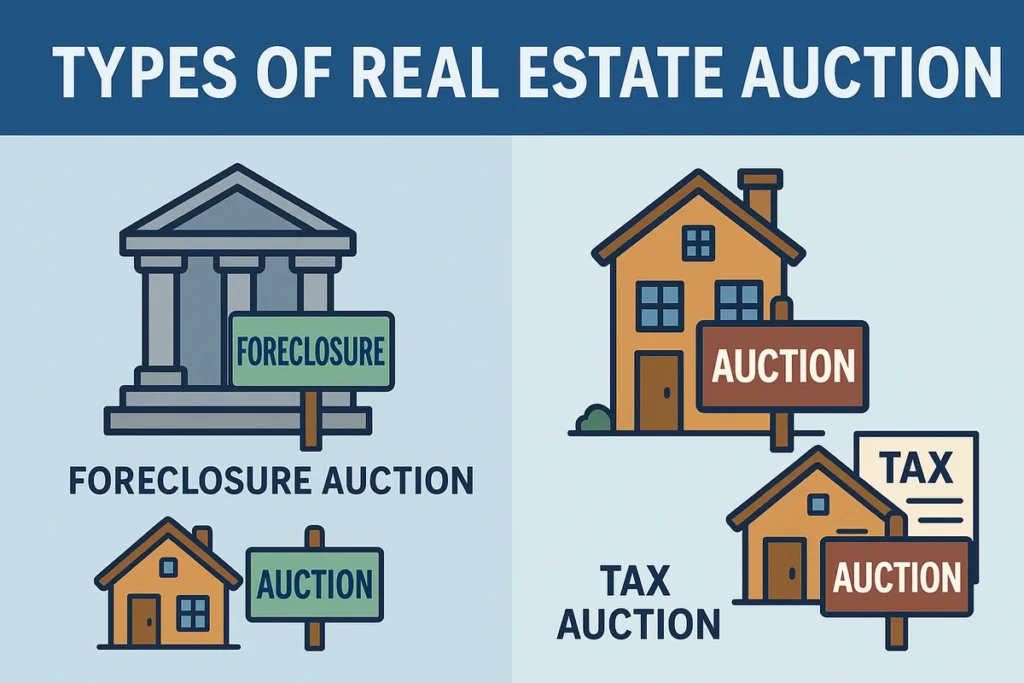
Real estate auctions can be goldmines for savvy investors, especially those hunting for undervalued properties in Maryland, Washington, DC, and Virginia. Whether you’re building a rental portfolio or chasing your next fix-and-flip, auctions offer unique opportunities to purchase properties below market value. However, not all auctions are the same. Let’s look at the main types of real estate auctions and what investors should know about each.
Foreclosure Auctions Conducted by Courts
The most common auction type many investors are familiar with is the foreclosure auction, often conducted by courts or trustees. When a borrower defaults on their mortgage, the lender may force the property into foreclosure.
- How they work: Foreclosure auctions are typically held on courthouse steps or online, depending on local rules. In Maryland and Virginia, trustee sales are common, while in Washington, DC, foreclosures are judicial and handled through the courts.
- Risks & rewards: These properties are usually sold “as-is,” often without interior access. Buyers need to do their homework on liens, taxes, and foreclosure occupancy status. Still, foreclosure auctions can offer some of the steepest discounts in the market.
Estate Auctions
When a homeowner passes away, their estate may liquidate real property through an estate auction. These sales are less about distressed situations and more about settling the affairs of the deceased.
- How they work: An executor or attorney hires an auction company to handle the sale. Investors may find properties in better condition than typical foreclosures, though competition can be fierce.
- Best for: Investors looking for properties with fewer legal complications and often in established neighborhoods.
REO Auctions (Real Estate Owned)
If a property doesn’t sell at foreclosure, it reverts back to the lender and becomes an REO property. Lenders often liquidate these assets through auction companies or online platforms.
- How they work: REO auctions are usually online and give investors more time to review the property. Title issues are often resolved, making them less risky than courthouse foreclosures.
- Best for: Investors who want discounted properties with fewer surprises.
For auctions specifically, look for local auction houses like Ashland Auction Group or Tidewater Auctions which may handle HUD properties.
Government & Tax Auctions
Local governments frequently auction properties for unpaid property taxes. Federal agencies (like HUD or the IRS) also conduct auctions for seized or surplus property.
- How they work: Tax auctions often allow bidding at county courthouses or online. Buyers may get properties for a fraction of their market value, but tax liens and redemption rights can complicate things.
- Best for: Experienced investors who know how to research title and redemption laws in Maryland, DC, and Virginia.
Bankruptcy Auctions
In bankruptcy cases, courts sometimes order properties sold at auction to satisfy creditors. These are less common but can be opportunities to pick up commercial and residential assets.
- How they work: Court-appointed trustees oversee the process. Buyers typically need proof of funds and must adhere to strict timelines.
- Best for: Cash-ready investors seeking both residential and commercial opportunities.
Who Conducts Real Estate Auctions?
Several companies specialize in real estate auctions, including:
- Auction.com – One of the largest online platforms for foreclosure and REO properties.
- Williams & Williams – A national auction firm handling residential, commercial, and luxury real estate.
- Hubzu – Popular for bank-owned properties and short sales.
- Alex Cooper Auctioneers – Based in Maryland, handling estate, foreclosure, and real estate auctions locally.
- Nicholls Auction Marketing Group – A Virginia-based company with a strong regional presence.
These firms, along with county governments and local trustees, conduct hundreds of auctions each year across Maryland, DC, and Virginia.
Final Thoughts
Real estate auctions aren’t one-size-fits-all. Foreclosure, estate, REO, tax, and bankruptcy auctions each come with their own risks and opportunities. The key is preparation: researching title history, understanding local foreclosure laws, and securing financing ahead of time.
At New Funding Resources, we specialize in providing hard money loans to local investors who want to act quickly when opportunities like auctions arise. Whether you’re eyeing a courthouse foreclosure in Prince George’s County or an estate sale in Northern Virginia, we can help you fund fast and compete with cash buyers.
 New Funding Resources
New Funding Resources 





Leave a Reply